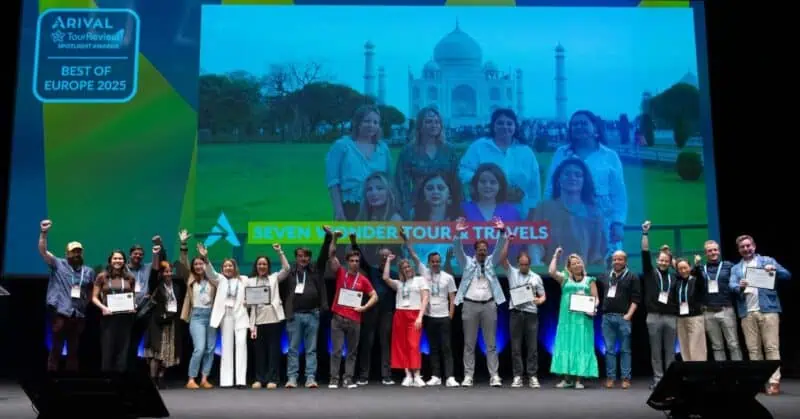There has been a lot of news recently about the effects of AI in search, and how it may or may not impact the future of Google. The truth is nobody knows what will happen to the future of ‘search’.
With the explosion of Generative AI (or GenAI) in the last 20 months, many types of searches can now happen directly through the AI – prompts and responses with the LLM (Large Language Model). These types of searches are now happening on the chatbot interfaces like ChatGPT, on new AI search engines like Perplexity, as well as directly within the search experience on Google and Bing. This shift is particularly noticeable in the travel industry, where generative AI for travel planning is becoming increasingly prevalent.
With so much changing, including the very basics of how Google works, many businesses are asking what they need to be thinking about to avoid losing traffic, both in the short and long term. The rise of artificial intelligence in travel is reshaping how consumers plan and book their trips, making it crucial for businesses to adapt.
Operator Takeaway: As a tour, activity or attraction operator, how do you ensure you’re getting found by travelers looking for things to do in the age of AI search? Understanding the role of AI in the travel industry is key to maintaining visibility and relevance.
Understanding Large Language Models (LLMs) and Their Impact on Search and Travel
Large Language Models are fantastic at providing answers on general knowledge. They can easily do things like describe points of interest, provide detailed historical information, and compare destinations based on custom preferences.This capability makes them particularly useful for travel planning, as they can quickly generate itineraries and suggest activities based on user preferences. What they are not good at is including specific business information, or accurate product information.
All LLMs are pre-trained on a specific dataset. You can think of that dataset as being approximately the entire internet. But once the training is complete, the model doesn’t continue to learn. LLMs are not databases. They don’t store facts. Your opening hours and tour departure times are not items that can be updated somewhere for the LLM to update its knowledge.
Tools like Perplexity, or features like the generative AI search results on Google generate their answers by first searching for live websites and then summarizing results in real-time. That generated text can link back to the website that was summarized.
Assuming this new stage in a world of Generative AI isn’t going to slow down, you have two new goals:
- LLM pre-training — to be discovered by the LLMs themselves, so that they can train on your content.
- Generative AI search — to be discoverable by the LLM searching for data to enhance results.
LLM Pre-training and Its Implications for AI in Tourism
This one is an unknown quantity. The main LLMs train on 12+ trillion words of data. Even if you have 200 blog posts of 1000 words each, that’s barely a drop in the ocean for an LLM, and unlikely to impact its training. However, as AI in tourism continues to evolve, creating high-quality, relevant content about your offerings and destination could become increasingly important for LLM training.
Generative AI Search
This is an area where you can take significant action. And the good news is that if you do the right things here, it will probably improve your chances of having an impact on LLM pre-training. It’s also mostly the fundamentals which you should be looking at for standard search engine optimization (SEO).
Learn more about SEO in the Age of AI here!
30 September – 3 October 2025
Insider Pro Access Members Save 20%
THE event of the year for solutions-focused In-Destination Experience creators and sellers
Get Your Spring Savings Ticket Today!
How to Optimize for LLMs and Generative AI in the Travel Industry
The good news is that they probably require the same actions from you. As artificial intelligence in travel becomes more sophisticated, these optimization strategies will be crucial for maintaining visibility.
Google Things to do
In many ways, Google’s “Things to do” is an ideal product in the age of Generative AI. Google’s Things to do listings are already surfacing in more and more areas within search results – desktop, mobile, Google Maps, etc. They are also showing up for an increasingly broad set of search terms.
With Generative AI search, the live, structured product data is exactly what the LLM struggles with. In Gemini (Google’s LLM), Google Travel results are already used in generative responses when it comes to hotels and flights. For example, if a user is searching for information about visiting Paris, Gemini may choose to offer hotel suggestions, and will pull listings directly from the Google Travel hotel feed. These display with links, either to the hotel website or to a hotel OTA (online travel agency).
If Google Things to do follows a similar path as Google Hotels (and it’s a good bet that it will), we should expect Google’s generative AI search results to expand at some point to include Google’s tickets and tours products with links to operator and attraction sites and OTAs.
Single Source of Truth
The Generative AI search tools will come looking for your information. The difference now is that your information may now be served in a very different format.
Information such as opening hours, start location, and other product details are important here. It’s a good assumption that whatever information Google is requesting for its Things to do listings and your Google Business Profile is EXACTLY the information that you should be prioritizing on your own website.
In other words, it’s never been more important for operators of tours, activities and attractions to ensure that they employ a “Single Source of Truth” approach to product information. Make sure that all of your product listing and company information is the same – everywhere.
Searches for things like restaurants on Google Maps offer filters such as “open now” or “wheelchair accessible.” These filters are also clues to what information Google finds useful. Even where these filters are not available, it’s likely that the AI will use that kind of information to display relevant results.
The Long-Tail Opportunity
Think of this as optimizing for a broad set of long-tail keywords.
Before GenAI, you might be targeting very short keywords:
e.g. “Paris Bus Tours”
Now, you might appear in a Generative AI result where somebody is having a conversation with an AI chatbot such as ChatGPT, Gemini or Bard and asks:
“What are things to do near the Eiffel Tower this weekend? Maybe Saturday afternoon, 2 kids, 7 & 9. No boats. No art museums. We already saw Notre Dame and Montmartre.”
Here, none of the words “Paris,” “bus,” or “tours” are used. The AI will read this and understand the full context. So if you offer bus tours in Paris, for example, and your website information and product descriptions are created right, they would be well matched for this search and could be summarized by the AI as part of its answer, along with a link.
A great way to think about this is also in your Frequently Asked Questions (FAQ) section. Previously, this was only for human consumption. Going forward, you can add a lot more long-tail information here, which is really targeting the AI more than the humans.
What’s Next With Generative AI Search and AI in Tourism
All of these tactics involve some guesswork on what the future holds. The good news is that there really aren’t many recommendations that wouldn’t also be a good idea if nothing changes. These future best-practices are based on first principles. These search fundamentals don’t change. It’s still really a matter of doing the right things, always with the end user in mind.
One more thing that’s coming: The future user will often not be a human. It will be the (AI) agent of a human. This isn’t very different to the AI search tool looking at your content. The future agent will come pre-briefed with goals and preferences of its human. It will expect answers. And if you don’t provide those answers, it will move on after 0.001 seconds to your competitor who does.
As generative AI for travel planning becomes more sophisticated, businesses in the tourism sector must adapt their online presence to cater to both human users and AI agents. This may involve providing more structured data, detailed descriptions, and comprehensive information about offerings to ensure visibility in AI-powered travel searches.
About the Author

Christian Watts is the founder and CEO of Magpie Travel, a SaaS company focused on content management for the tours and activities sector. Co-host of the Experience This! Travel show and considered an expert in topics including Google Things to do and Generative AI, he is also a regular speaker at Arival events.
Join us at an upcoming Arival event to learn more about the latest in Generative AI search, Google Things to do and other online marketing strategies for tours, activities and attractions. At Arival 360 | San Diego in October, Christian Watts will be leading in-depth workshops on how operators can use AI. Make game-changing connections with leaders, peers, distributors and tech providers from the “Best Part of Travel” . We hope to see you there!
Become an Insider Pro Access member today and get access to the full library of Arival research, plus many other benefits such as free consulting sessions, special discounts and 20% off in-person events, starting from $179 per year.
Sign up to receive insights tailored for the in-destination industry as well as updates on Arival.

















